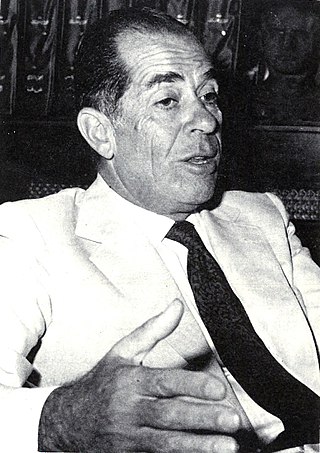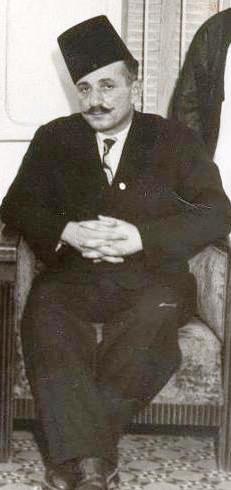
The United Arab Republic was a sovereign state in the Middle East from 1958 until 1961. It was initially a short-lived political union between Egypt and Syria from 1958 until Syria seceded from the union following the 1961 Syrian coup d'état. Egypt continued to be known officially as the United Arab Republic until it was formally dissolved by Anwar Sadat in September 1971.

Kamal Fouad Jumblatt was a Lebanese politician who founded the Progressive Socialist Party. He led the National Movement during the Lebanese Civil War. He was a major ally of the Palestine Liberation Organization until his assassination in 1977. He authored more than 40 books centred on various political, philosophical, literary, religious, medical, social, and economic topics. In September 1972, Kamal Jumblatt received the International Lenin Peace Prize. He is the father of the Lebanese Druze leader Walid Jumblatt and the son-in-law of the Arab writer and politician Shakib Arslan.

The 1958 Lebanon crisis was a political crisis in Lebanon caused by political and religious tensions in the country that included an American military intervention, which lasted for around three months until President Camille Chamoun, who had requested the assistance, completed his term as president of Lebanon. American and Lebanese government forces occupied the Port of Beirut and Beirut International Airport. With the crisis over, the United States withdrew.

Camille Nimr Chamoun was a Lebanese politician who served as the 2nd president of Lebanon from 1952 to 1958. He was one of the country's main Christian leaders during most of the Lebanese Civil War.

Fouad Abdallah Chehab was a Lebanese general and statesman who served as president of Lebanon from 1958 to 1964. He is considered to be the founder of the Lebanese Army after Lebanon gained independence from France, and became its first commander in 1946.

René Moawad was a Lebanese politician who served as the 9th president of Lebanon for 18 days, from 5 to 22 November 1989, before his assassination by unknown assailants.

Charles Helou was a Lebanese politician who served as the 4th president of Lebanon from 1964 to 1970.

Raymond Eddé was a Lebanese Maronite statesman who served his country for many years as a legislator and cabinet minister. He led the Lebanese National Bloc, an influential political party. The son of former President Émile Eddé, Raymond Eddé was himself a candidate for the presidency in 1958, and was proposed for the post on numerous subsequent occasions. He is remembered for having held consistent views, which he refused to compromise for the sake of political gain. His supporters called him "Lebanon's Conscience." He was a strong nationalist, who opposed the French Mandate, and later, Syrian, Israeli, and Palestinian military interventions in Lebanon.

Saeb Salam was a Lebanese politician, who served as Prime Minister six times between 1952 and 1973. Following his death, the Lebanese daily As-Safir described Salam as "most successful in dealing with the media and in presenting a particular image of himself to people on a daily basis through wearing his customary carnation ... and expounding unforgettable slogans", and that he was Lebanon's most popular prime minister after independence leader Riad Al Solh. A significant aspect of Salam was that, unlike other Lebanese leaders, he did not act as a chief over a particular area in the country. Salam fiercely advocated the unity of Lebanon.

The Presidentof the Lebanese Republic is the head of state of Lebanon. The president is elected by the parliament for a term of six years, which cannot be renewed immediately because they can only be renewed non-consecutively. By convention, the president is always a Maronite Christian who fulfills the same requirements as a candidate for the house of representatives, as per article 49 of the Lebanese constitution.

Adel Osseiran, also transliterated Adil 'Usayran or Adil Osseyran, was a prominent Lebanese statesman, a former Speaker of the Lebanese Parliament, and one of the founding fathers of the Lebanese Republic.

Abdallah El-Yafi was the prime minister of Lebanon serving twelve times between 1938 and 1969.

Ahmad El-Assaad or Ahmad Al-As'ad was Speaker of the Lebanese Parliament from 5 June 1951, till 30 May 1953.

Emir Khaled Chehab was a Lebanese politician and the 8th Prime Minister of Lebanon, serving for two short terms. The first was between 21 March 1938 until 1 November 1938 during the rule of President Émile Eddé during the French Mandate. He was also the first Prime Minister during the rule of President Camille Chamoun for the period of September 1952 to April 1953, during which time the electoral law to guarantee women's suffrage in Lebanon was passed.

Maarouf Saad was a Lebanese politician and activist. He served as Sidon's representative in the Parliament of Lebanon between 1957 and 1972. He founded the Popular Nasserite Organization in 1973. Saad was known to have a charismatic and populist relationship with the residents of Sidon and the adjacent Palestinian refugee camps, according to historian Samir Khalaf. Nonetheless, tensions developed between Saad and the Palestine Liberation Organization in the 1970s as they competed for influence in Sidon. Saad's assassination sparked the Lebanese Civil War, and he is considered by many historians the conflict's first casualty.
The Syrian coup d'état of 1961 was an uprising by disgruntled Syrian Army officers on 28 September 1961, that resulted in the break-up of the United Arab Republic and the restoration of an independent Syrian Republic.
Joseph Elias Tohme Skaf was a Lebanese politician who is considered one of the most prominent personalities of the Skaff family in the city of Zahle. He held several ministerial positions from 1955 to 1988 under 5 different presidents which include Camille Chamoun, Fouad Chehab, Suleiman Franjieh, Elias Sarkis and Amine Gemayel.
An indirect presidential election was held in the Parliament of Lebanon on 18 August 1964, resulting in Charles Helou being elected President of the Lebanese Republic.

Chehabism is a political ideology in Lebanon which follows the principles of former president and army general Fouad Chehab. The ideology later influenced the presidency of Charles Helou and Élias Serkis.
An indirect presidential election was held in the Parliament of Lebanon in 1952 following the end of Fouad Chehab's military cabinet. The Parliament of Lebanon elected Camille Chamoun, who at that time was an ally of Kamal Jumblatt and a member of the Progressive Socialist Party parliamentary bloc, as the next president of Lebanon on 23 September 1952 to officially succeed Bechara Khoury's term becoming the second president of the Lebanese Republic. Chamoun won with 74 votes out of the 76 attending MPs.

















